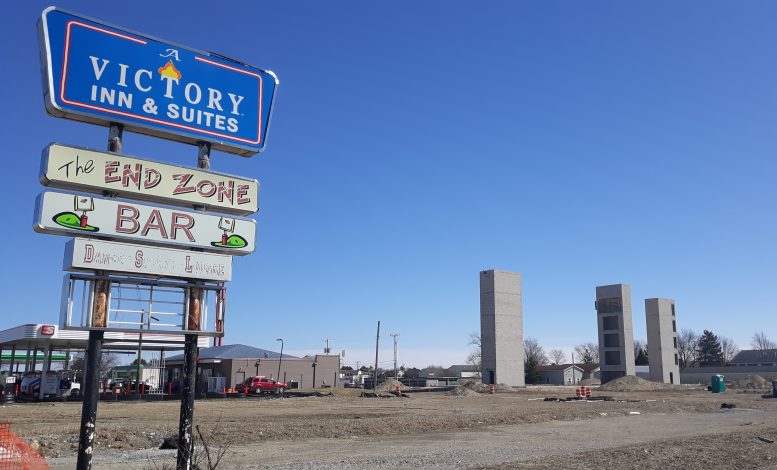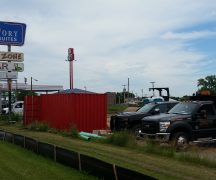By JAN LARSON McLAUGHLIN
BG Independent News
Construction has stalled on the new hotel being built on the site of the defeated Victory Inn in Bowling Green.
The owner of the Victory Inn – Jamal Garmo of Michigan – began work last summer on a new Home2 Suites by Hilton, which specializes in extended stays.
However, work on the site has come to a standstill, with just the stair and elevator towers sticking up on the construction scene.
The owner has all the necessary zoning permits from the city, according to Bowling Green Planning Director Heather Sayler.
“For us, it’s just a waiting game,” Sayler said.
The owner also acquired the necessary building permits from the Wood County Building Inspection Office. Those permits will expire one year after progress stops on the site, according to Mike Rudey, the county’s chief building inspector.
The exact date of the halt in construction is not known. The developer has stopped contacting the building inspection office for inspections of the construction.
“We’ve been watching it closely,” Rudey said Monday. “No one has sent me a letter about why they stopped work. The permit is good as long as they continue to make progress.”
William Fehse, of Southfield, Michigan, whose name is on the zoning certificate, said Monday morning that he would check on the construction delays. He failed to call back with information explaining the status of the project.
If the building permit expires, the developer will have to re-apply in order to restart construction, Rudey said.
If the developer fails to contact building inspection, then the city and county will have to discuss the next step, he said.
“Then we’ll have a conversation with the city about that and see what we’re going to do with this,” Rudey said.
The halt in construction is just the latest in a string of problems for the site at 1630 E. Wooster St. The previous hotel there – Victory Inn – was demolished in 2015 after nearly five years of Bowling Green and Wood County Health Department officials trying to get hotel to clean up issues. The hotel was frequently the source of complaints about bedbugs, plumbing and electrical problems, the lack of smoke alarms and cleanliness violations.
Garmo approached the city’s Zoning Board of Appeals in 2016, since his new proposed hotel exceeded the city’s height and story limits.
His request was for a variance to allow construction of a 107-room hotel on the eastern portion of the seven acres that previously housed Victory Inn. The proposed hotel would be 65 feet tall, five feet taller than allowed, and five stories high, one story higher than allowed in B-2 general commercial zoning
The request was initially turned down.
By building upward, the 107-room hotel would have a much smaller footprint than the two-story Victory Inn which had 103 rooms, the developer said. The developer said the smaller footprint of the taller hotel will allow for other businesses on the seven-acre site. He said the remainder of the property could possibly be “mixed use” with some retail, office and residential.
Garmo filed an appeal of the city’s decision, stating the denial was “unconstitutional, arbitrary, capricious and an unreasonable exercise of discretion.” The appeal also stated the denial posed an “unreasonable hardship” against Garmo.
During a zoning meeting in April of 2016, he expressed his displeasure with the zoning board of appeals.
“Five stories is a signature from the highway,” Garmo said, adding he originally wanted the hotel to be six stories.
“I’m very disappointed, very disappointed,” he said, telling the board the hotel would have been a $10 million investment in the city. “This would be a Taj Mahal in the city – the best thing ever going to happen to your city.”
On behalf of Garmo, Andy Andre, of Bud Design & Engineering Services Inc. in Grand Blanc, Michigan, explained to the board that Hilton was insistent on the signature “beacon” look of the Home2 hotels, and that feature pushed the height beyond the city’s limit.
“The brands do not want anything less than four stories,” Andre said. And removing the “beacon” part of the structure was out of the question, he said, comparing it to asking McDonald’s to limit its sites to one arch.
In November of 2016, the city changed the zoning language to allow a hotel to have five floors, as long as the height of the building did not exceed 60 feet.


